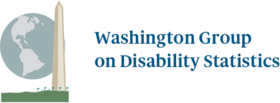Resources
The Washington Group has assembled an array of resources on disability. These provide background and guidance about the WG, the definition and measurement of disability, and how disability is manifested in the international agenda, particularly within the UN Convention on the Rights of Persons with Disability and the 2030 Agenda on Sustainable Development.
WG-Extended Set: Results of Cognitive and Field Testing – UN ESCAP 2010
The United Nations Economic and Social Commission for Asia and the Pacific (UN ESCAP) carried out a set of projects to improve disability statistics in the Asia/Pacific region. The first project (2004 – 2006) focused on Improving Disability Statistics and Measurement; introduced the International Classification of Functioning, Disability and Health (ICF) as a framework for the development of questions on disability and functioning; discussed question design and testing for census to measure disability through censuses, and produced a Disability Statistics Training Manual. The second project (2008 – 2010) was entitled ‘Improvement of Disability Measurement and Statistics in Support of Biwako Millennium Framework and Regional Census Programme’, and was a follow up to the earlier project. It focused specifically on the cognitive and field testing of an extended set of disability questions for surveys.
www.unescap.org/resources/training-manual-disability-statistics
Disaggregation by Disability Status: A Report on Selected Sustainable Development Goal (SDG) Indicators
The inclusion of persons with disabilities in the 2030 Agenda for Sustainable Development has become an uncontested priority with the principle of ‘leaving no one behind’ in sharp contrast with the past when people with disabilities were largely excluded from the global development agenda.
To ensure people with disabilities are not left behind, sufficient data must be collected so that all person-level Sustainable Development Goal (SDG) indicators can be disaggregated by disability status. This will allow for the comprehensive monitoring of the well-being and inclusion of persons with disabilities, and the advancement of their rights.
